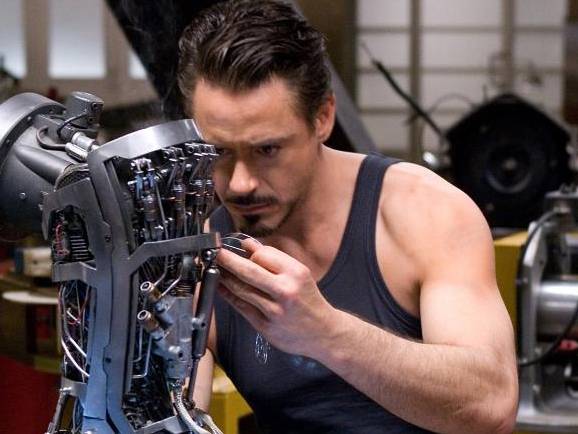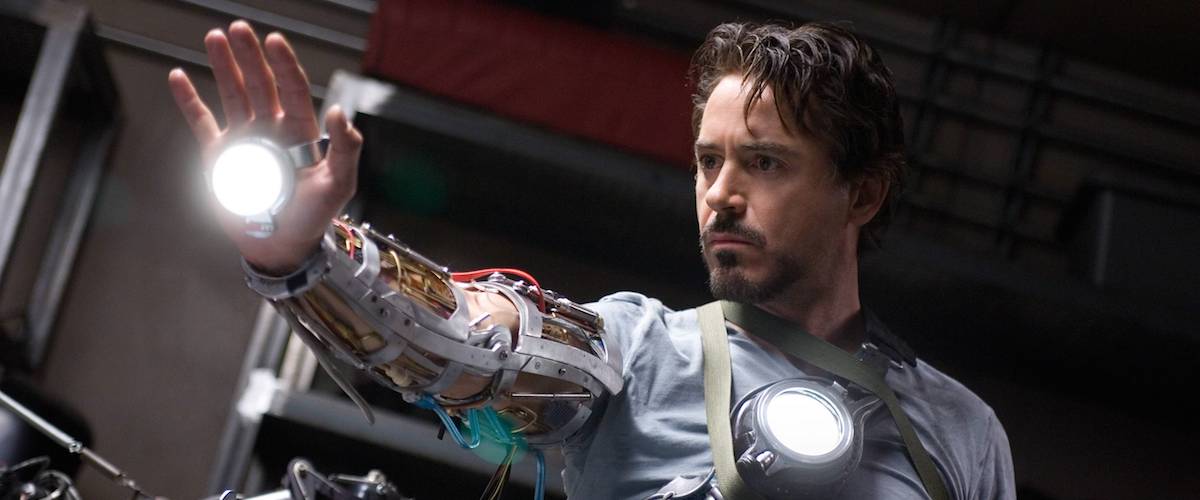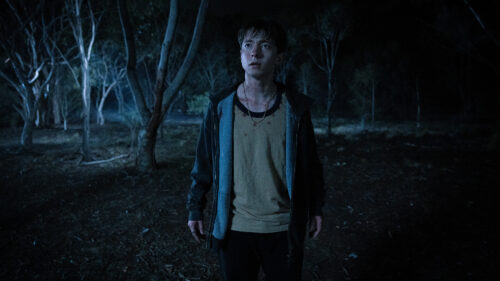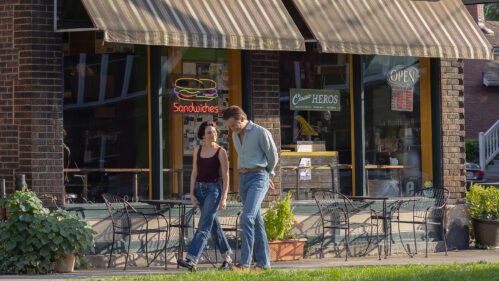The world needs another comic book movie like it needs another Bush administration, but if we must have one more (and the Evil Marketing Geniuses at Marvel MegaIndustries will do their utmost to ensure that we always will), “Iron Man” is a swell one to have. Not only is it a good comic book movie (smart and stupid, stirring and silly, intimate and spectacular), it’s winning enough to engage even those who’ve never cared much for comic books or the movies they spawn. Like me.
“Iron Man” begins on dangerous ground: in the harsh terrain of Battleground Afghanistan. A convoy of Humvees (inadequately armored, no doubt) speeds through the desert carrying ultra-bazillionaire Death Merchant, and notoriously dissolute playboy, Tony Stark (Robert Downey Jr.), scotch in hand, flirting with the female driver.
Right on cue, an IED detonates, the Hummers are ambushed by Taliban-esque fighters, the American soldiers are slaughtered, and Tony is kidnapped. It won’t be the first time that this gaudy piece of summer-movie pulp fiction strays a little too far into bloody Mess o’ Potamian reality for comfort. Is this political commentary of some kind, or just exploitation? Like its hero “Iron Man” takes false steps, stumbles, and even occasionally crashes, yet quickly recovers its footing.
The reason it’s so nimble is that director Jon Favreau (“Elf,” “Zathura“) and his fleet crew of actors grasp the action-fantasy premise and treat it with the looseness and sharpness of improvisational comedy. (Favreau himself has worked out with The Groundlings troupe in Los Angeles from time to time.) It’s difficult to tell how much of what they’re doing is taken directly from the script (credited to four writers, and who knows how many others labored behind the scenes), but even when they’re reciting somber dialog-bubble exposition, they treat it the way an improv actor would: smoothly feeding information into the scene, building a foundation on which everybody can work, and play.
Tony is the brilliant prodigal heir to the weapons-manufacturing fortune of Stark Industries, the gargantuan techno-blammo conglomerate built by his titan of a father. He’s the embodiment of the military-industrial complex that President Eisenhower warned against in 1961 — a financial superhero for whom war is good business, and whose business interests guarantee there will always be a market for war. Like a hawkish version of Steve Jobs, Tony is not only a master salesman and showman but a real engineer who can assemble astonishingly sophisticated equipment from basic materials — in his garage or a secret prison-cave in No-Man’s-‘Stan.
This guy is so unbelievably, fantastically wealthy that the very concept of money loses all meaning. So what if he lives in a Starship Enterprise house perched on a seaside cliff in Malibu? He still has to fly for long, boring stretches to get to faraway places. In his private jet, sure, but doesn’t he find it annoying to be that wealthy and still constrained by the laws of physics? He can afford anything he wants, but his TV still shows the same “Access Hollywood” crap that’s available to everybody else. It’s like Bill Gates once said: No matter how much you pay for a hamburger, how much better is it going to taste?
Though he has plowed his way through more bimbos than he even wants to remember, Tony’s real intimates are the best that money can’t buy: his best buddy Jim Rhodes (Terrence Howard), the military half of a not-at-all-complex military-industrial friendship; his endearing Girl Friday Pepper Potts (Gwyneth Paltrow), who brings repressed passion to her professional role as a personal assistant; and his business partner Obadiah Stane (Jeff Bridges, with Lex Luthor dome and Irish Wolfhound chin). Let us take a moment, now, to thank the creator of that name: Obadiah Stane. You may wish to repeat it, like a mantra, as you go through the rest of your day.
Tony and Obadiah are old-world Bush-Doctrine perpetual-war profiteers (listen for the untranslated word “Halliburton” in the dialogue of one of the Afghan terrorissimos): They believe in spreading and maintaining unilateral American dominance through military and economic means, and give lip service to the pseudo-patriotic sentiment that whatever is good for Stark Industries is good for the good ol’ US of A. Until Tony is captured, that is, and he begins to understand that there’s a lot more to power, and leadership, than brute weaponry can ever convey. That’s all quite true, but it’s not presented as a terribly convincing plot point here. It just gives our anti-hero a chance to become our hero, in the guise of Iron Man.
Downey and the CGI both lend gravity to the Man of Titanium Alloy. The effects emphasize the weight and bulk of his metallic suit and the difficulty of aerial navigation with powerful thrusters on the bottoms of one’s feet. But the most potent FX are Downey’s eyes — those big, expressive brown orbs that seem to be highlighted with natural mascara to make them pop. Downey uses his body like a dancer or an acrobat, but has there been any other actor since, maybe, Bette Davis whose eyelashes are so vital to his performance? Favreau seems to understand this: When Tony puts on his Iron Man mask, we spend as much time inside it, just looking into Downey’s eyes as they fill the screen, as we do watching him zoom through the atmosphere or stomp around on the earth’s surface. It’s the best special effect in the movie.
Downey has entered a hard-earned period of grace in his career, where it seems he can do no wrong. He’s always been exceptional, but right now we’re just so glad to see him. It helps immeasurably, of course, that he consistently brings more to his material than the part demands. Whether the movie itself doesn’t measure up to him (“Less Than Zero,” “Chaplin“), or is very good indeed (“Short Cuts,” “Wonder Boys,” “Zodiac“), he contributes something that makes it — or, at least, him — something to see.
An equally welcome sight is Bridges, who must be the most accomplished, versatile and underrated actor in movies. The man is one of the all-time greats, as a quick look at a sample of his resume will remind you: “Fat City,” “The Last Picture Show,” “Bad Company,” “Rancho Deluxe,” “Hearts of the West,” “Stay Hungry,” “Winter Kills,” “Heaven's Gate,” “Cutter’s Way,” “Tron,” “Starman,” “Tucker,” “The Fabulous Baker Boys,” “The Fisher King,” “American Heart,” “Fearless,” “The Big Lebowski,” “The Door in the Floor,” “Seabiscuit,” “Tideland”… Some of them are acknowledged classics, some deserve to be but haven’t been (re-)discovered yet, and some are risky experiments that succeed or fail impressively, but Bridges himself long ago achieved National Treasure status. If only more people would notice.
Obadiah Stane (again, thank you) could have been nothing more than a fabulous name — enough to do half the work for an actor. Bridges finds bits of behavior, like the way he holds his whiskey glass, that make him someone memorable, someone in particular rather than just a generic character.
In so doing, he and his colleagues have made “Iron Man” more than just a generic comic book movie.




















